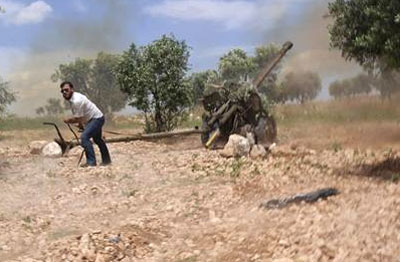
US senate backs arming Syrian rebels
Washington, May 22, 2013
A US Senate panel has voted overwhelmingly to send weapons to rebels fighting Syria's government, but it was not clear who would get the arms even if the bill succeeds, as Washington struggles to deal with its response to the conflict.
The Senate Foreign Relations Committee voted 15-3 for legislation that would send arms to "vetted" moderate members of the Syrian opposition, the first time US lawmakers have approved such military action in the two-year-old civil war.
The measure will now be considered by the full Senate, where a vocal group of legislators has been pushing for President Barack Obama to do more to help the rebels waging a war in which at least 80,000 people have died.
Only three senators on the committee - Republican Ron Paul and Democrats Tom Udall and Chris Murphy - opposed the bill. But lawmakers from both parties expressed concerns about whether sending arms risked putting powerful weapons into the wrong hands, including fighters with ties to al Qaeda.
"I don't think we know who we're arming. And the truth is, it changes every day. Sometimes resistance fighters are fighting each other," Udall said.
Even backers of the bill said they believed that the United States had to act largely to mitigate the risks of not doing anything.
"The situation in Syria is critical for Syria, for the region and for US efforts to counter extremism," said Democratic Senator Robert Menendez, the panel's chairman and a co-author of the bill.
There is less enthusiasm for arming the rebels in the Republican-controlled House of Representatives, so it is not clear whether the Senate bill would ever get through Congress and reach Obama and be signed into law.
In Syria, Lebanese Hezbollah fighters and Syrian soldiers, backed by air strikes, renewed an offensive aimed at driving rebels from a town near the Lebanese border, raising fears about the conflict spreading in the region.
Republican Senator James Risch, who eventually voted yes to the weapons bill, expressed concerns about the prospects in Syria if President Bashar al-Assad were ousted.
"I'm not sure that the people we help here are going to be particularly grateful once the deed is done," he said.
As the US moves to end more than a decade of war in Iraq and Afghanistan, most Americans oppose getting involved in Syria. A Reuters/Ipsos online poll on Tuesday showed that 60 per cent of Americans believe the country should not intervene, compared with only 12 per cent who think it should.
The Obama administration has been resisting sending lethal military aid to the Syrian rebels, despite intelligence this month that Assad's forces likely used chemical weapons against the rebels - something Obama had called a "red line."
The US president said last week he would consider both diplomatic and military options to pressure Assad, but that does not satisfy his critics.
Republican Senator John McCain, one of the loudest voices calling for military aid, dismissed concerns that the United States may not be able to properly vet rebels in an increasingly chaotic Syria, and scoffed at plans for a peace conference in Geneva next month.
"There's plenty of people that we can work with and set up a legitimate government, and to say that we can't is baloney. It's just not true. It's another cop-out and so is this, quote, 'conference' a cop-out because we're not going to do anything until we have the conference," he told reporters before the hearing.
"Meanwhile, people are being slaughtered. Meanwhile, Assad is gaining the initiative," he said.
Analysts say Washington could pick the right people to arm, citing success doing so in previous wars in Libya, Kosovo and Bosnia and noting that Washington has been facilitating the provision of arms to the rebels by allies for much of the Syrian conflict.
"This is a feasible prospect," said Gregory Koblentz, a fellow at the Council on Foreign Relations and an expert on the Middle East.
But he said it will not be easy, explaining that the US would have to increase its military presence in the region to be successful.
"Clearly one of the lessons learned from Afghanistan is to do it yourself to make sure that you have your own assessment," Koblentz said.-Reuters







